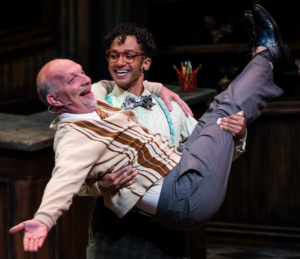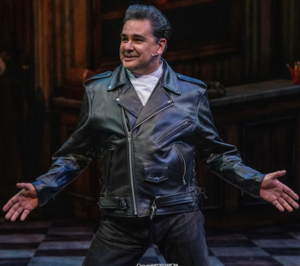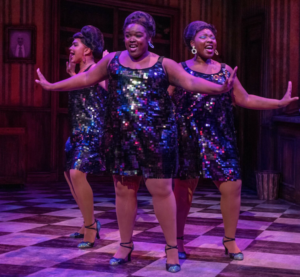Photos by Luis Escobar, Reflections Photography Studio
Production dates April 25-May 12, 2024 in Santa Maria and June 13-July 7, 2024 in Solvang.
Just how bad does a plant (yes, a plant) have to be to inspire the most innocent among us to commit murder (and be willing to commit murder itself)?
And, secondly, does that sound like an alien moral conundrum—and perfect set-up—for a “hilarious musical hit and sci-fi homage to B-movies” to you?
The correct answers to these questions are one, very bad indeed (as is the human who falls under its sway), and two, regardless of what you think, PCPA certainly thinks it’s a perfect set-up, throwing some of its best creative minds behind its production of Little Shop of Horrors playing April 25 through May 12 at the Marian Theatre in Santa Maria and June 13 through July 7 at Solvang Festival Theater.
. . . now’s the time to see this strange, off-kilter, often amusing, sometimes touching, show.”
If you’ve never seen this off-Broadway Alan Menken-Howard Ashman horror-comedy-rock musical from 1982, or the 1986 musical-comedy film directed by Frank Oz based on it, or the original Roger Corman-directed horror-comedy film (not a musical) from 1960, now’s the time to see this strange, off-kilter, often amusing, sometimes touching, show.
 First, let’s talk plants. Or one very specific, very alien, very hungry plant (voiced by very-present-in-both-plant-and-human-and-alien-form Diva LaMarr, who is fabulous and graced with an extraordinary voice). Dubbed Audrey II by timid skid-row flower shop employee Seymour (a perfectly cast Alexander Pimentel) as he plaintively urges the initially tiny plant to “Grow for Me,” it does just that—once Seymour discovers the correct plant food: human blood.
First, let’s talk plants. Or one very specific, very alien, very hungry plant (voiced by very-present-in-both-plant-and-human-and-alien-form Diva LaMarr, who is fabulous and graced with an extraordinary voice). Dubbed Audrey II by timid skid-row flower shop employee Seymour (a perfectly cast Alexander Pimentel) as he plaintively urges the initially tiny plant to “Grow for Me,” it does just that—once Seymour discovers the correct plant food: human blood.
Needless to say, this is the point where horror begins to compete with comedy; director Keenon Hooks has his hands full making sure his cast members (with the exception of the hopelessly villainous alien plant and a dentist who is an irredeemably very bad guy) remain sympathetic. Spoiler alert: the good in the “good guys” doesn’t save them, and the “bad” in the dentist, played by the versatile and always fearless George Walker as quite entertainingly addicted to his “giggly gas,” makes his ultimate demise even funnier.
 The “good guys” include the always-game-for-anything Billy Breed as flower shop owner Mr. Mushnik, the lovely-voiced Molly Dobbs as shop employee Audrey (after whom Seymour names his plant), and a truly marvelous trio who serve as a kind of all-knowing vocal Greek chorus: Brezae Weeks, Etasha Caston, and Marisa Moenho. Music director Michael Wilkins couldn’t have asked for a better group of singers, or a better group of musicians (Nolan LeMay, Chris Mariscal, Jason Wells) who with Wilkins comprise the live band that shares the stage throughout.
The “good guys” include the always-game-for-anything Billy Breed as flower shop owner Mr. Mushnik, the lovely-voiced Molly Dobbs as shop employee Audrey (after whom Seymour names his plant), and a truly marvelous trio who serve as a kind of all-knowing vocal Greek chorus: Brezae Weeks, Etasha Caston, and Marisa Moenho. Music director Michael Wilkins couldn’t have asked for a better group of singers, or a better group of musicians (Nolan LeMay, Chris Mariscal, Jason Wells) who with Wilkins comprise the live band that shares the stage throughout.
It’s truly a treat to have live music accompany a theatrical performance of this scope.
Michael Gould and Andrew Missael Banderas, working with assistant director and puppetry director Joe Galina, are the puppeteers who ably take the very alien Audrey II through its growth stages.
. . . a sometimes shocking, often slapstick, mostly quite satisfying snack for us humans to enjoy.”
Costume designer Caroline Rein, lighting designer Cod Soper, sound designer Tony Angelini, and scenic designer Joe C. Klug—not to mention their multiple crew members—have a field day with the pieces they have gorgeously assembled into a cohesive if purposefully off-kilter puzzle for Hooks and his cast to play with.
 Klug’s zig-zag design for Mushnik’s flower shop (exteriors and interiors) is a marvel. Soper’s skills are on grand display targeting the various scenes of the action on the one-set stage. Angelini and his crew ensure that we not only enjoy the live instruments backing up the vocalists, but even the smaller, satisfying sounds of thunder or a clock chiming or a shop bell tinkling every time someone crosses the threshold. And from Seymour’s sweater vests and bow ties to Audrey’s houndstooth coat to the shimmering sheaths and shoes of the chorus, Rein allows the audience to appreciate who these characters are even before they open their mouths.
Klug’s zig-zag design for Mushnik’s flower shop (exteriors and interiors) is a marvel. Soper’s skills are on grand display targeting the various scenes of the action on the one-set stage. Angelini and his crew ensure that we not only enjoy the live instruments backing up the vocalists, but even the smaller, satisfying sounds of thunder or a clock chiming or a shop bell tinkling every time someone crosses the threshold. And from Seymour’s sweater vests and bow ties to Audrey’s houndstooth coat to the shimmering sheaths and shoes of the chorus, Rein allows the audience to appreciate who these characters are even before they open their mouths.
There are many little moments to appreciate in this production. Breed and Pimentel gleefully sharing a tango when they decide to embrace a father-son relationship (“Mushnik and Son”). Dobbs longingly dreaming of a tract house and a toaster and a sweet little guy (“Somewhere That’s Green”). Walker happily, melodramatically giggling himself to death [“Now (It’s Just The Gas)”].
And in the end, just as Audrey II’s hunger is ultimately sated, Little Shop of Horrors at PCPA provides a sometimes shocking, often slapstick, mostly quite satisfying snack for us humans to enjoy.
